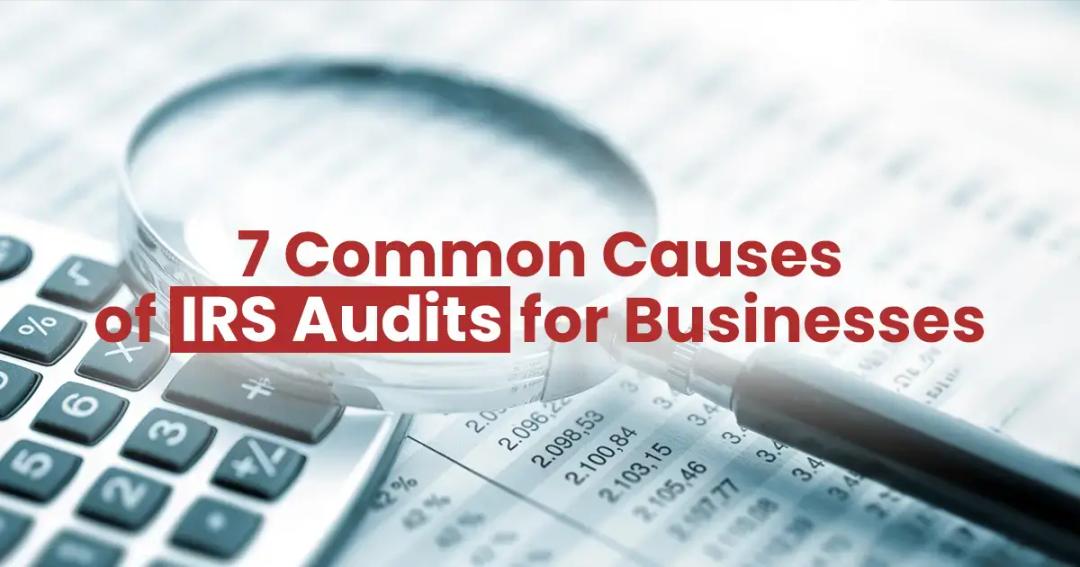
For small business owners and taxpayers, one of the most inconvenient things to happen is to receive a notice of an IRS audit. For many people, it’s not always clear right away why they were chosen for an audit. It can feel entirely random and even a bit unfair.
The truth of the matter is that although your chances of being audited are small, there’s always still a chance that it could happen. Sometimes audits are completely random. Other times, something about your return was flagged for further review which led to the audit. Check out some of the common occurrences that cause the IRS to audit you so you can try to avoid them.
1. Math or Data Entry Errors
Math or data entry errors are easy to overlook. However, miscalculating your income or using the wrong formula or form for your taxes is no excuse when it comes to the IRS. If it’s a minor error, the IRS might simply contact you about it and ask for a correction. However, a larger error may lead to the IRS discovering other issues with your return, which could trigger an audit.
Avoid math or data entry errors with the help of a professional accountant. They’ll not only serve as a preparer for your taxes, but they’ll also do a final check on your return to ensure no sneaky mistakes get through.
2. Claiming Too Many Business Expenses or Losses
Small business owners use Schedule C to report business profits and losses. While you should take every deduction that you qualify for (after all, failing to do so is basically the same as leaving money on the table), you must still be mindful of the IRS rules.
The IRS compares business returns against other returns from small business owners in similar occupations and fields. If you own a car repair business and deduct three times the average amount of travel expenses as other car repair business owners, they’ll likely notice and flag your return for a review.
Other common business deductions that trigger audits include:
- Unreported income, especially from third-party payment platforms
- Business deductions that are deemed unusual for your occupation
- Home office or vehicle deductions that include personal use.
3. Large Charitable Deductions
You’re certainly entitled to a well-deserved charitable deduction if you made generous charitable contributions. However, it should go without saying that you should never, under any circumstances, falsify donation information. Don't claim the deduction if you don’t have a receipt or documentation to back up a donation.
Furthermore, if your charitable deductions seem out of proportion with your reported income, that’s certain to raise some flags at the IRS. For example, if you report an income of $50,000 and claim $25,000 in charitable contributions, you can bet that the IRS will have some questions.
4. Underreporting Your Income
Perhaps one of the easiest ways to trigger an IRS audit is to underreport your income. Whether you choose not to report income you made from a side gig or forget to include a W-2 form, the IRS will likely find out about it.
One of the most common scenarios for underreporting income is when people fail to report earned 1099 income (nonwage income from activities like freelancing, stock dividends, etc.). Don’t forget: the IRS already knows about this income because the payer, whether that’s the bank or a freelance client, also sent a copy to the IRS!
Even if it’s accidental, you’re still on the hook for reporting all of your income. Here are some common mistakes people make when reporting income that triggers audits:
- Not accounting for all W-2 income — all the more likely if you had more than one job last year.
- Not reporting side gig money.
- Excluding interest and earnings from investment or savings accounts.
- Not reporting capital gains on cryptocurrency trades, property sales, or stock trades.
5. High Employee Compensation
Paying unusually high salaries to family members or other employees might raise eyebrows, particularly if the salaries seem excessive for the jobs performed.
6. Cash Transactions
Businesses dealing heavily in cash may be viewed as suspicious. This is due to it being easier to underreport cash income.
7. Incorrectly Classifying Workers
Incorrectly classifying workers can lead to an IRS Audit. It's an immediate red flag to the IRS if you accidentally misclassify a W2 employee as a 1099 independent contractor. This can save you on taxes in the short-term, but present problems in the long run.
Your Rights As a Taxpayer
If you’ve been selected for an IRS audit, you have the right as a taxpayer to know why you are being audited and the right to appeal disagreements. You also have the right to representation, whether that’s yourself or an authorized representative.
An authorized representative could be an Enrolled Agent (EA), a Certified Public Accountant (CPA), or an attorney. At 1-800Accountant, our tax professionals are ready to act on behalf of small business owners who receive an IRS audit notice. With Audit Defense, we do the work for you, which includes working on your behalf to put together a strategy, gather the necessary documents and information, and provide peace of mind to ensure your rights are protected throughout the audit process.
Talk to an expert today if you have questions about Audit Defense, small business taxes, or other tax-related questions!
This post is to be used for informational purposes only and does not constitute legal, business, or tax advice. Each person should consult his or her own attorney, business advisor, or tax advisor with respect to matters referenced in this post. 1-800Accountant assumes no liability for actions taken in reliance upon the information contained herein.
